Hard Sole Shoes for Babies – Are They the Right Choice for Your First Walker?
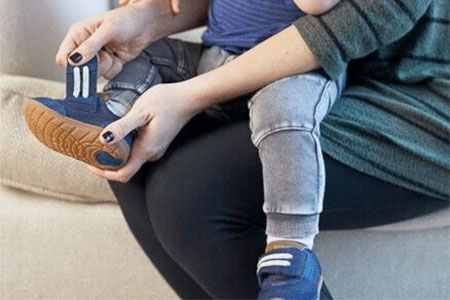
One of the most popular questions I get asked at the children’s shoe store that I work for is: Do babies who are learning how to walk need a pair of hard sole or soft sole shoes? I will answer this question shortly based on my many years of shoe fitting experience, and I will also show you a list of the best hard sole shoes for babies.
Shoes You Allow Your Baby to Walk Barefoot?
Babies learn how to take their first steps by gripping their toes to the ground and I always recommend parents to allow their babies to walk barefoot at home to promote healthy foot development.
But if a baby doesn’t need shoes around the house, when do shoes actually come into play?
As soon as you decide to take your baby to play outside where surfaces might be uneven, hot, cold or rocky, shoes come into play and they are worn for protection purposes mostly. The shoes must provide a key feature to help your baby walk: sensory pods. This feature allows babies to “feel” the terrain below them, which makes them feel more stable and confident when walking.
Keep in mind that I don’t recommend a pair of hard sole shoes for a baby that is learning how to walk as they will make the whole process of learning how to walk a lot harder. A baby that is in the process of learning how to walk doesn’t have the strength to bend a shoe with a harder sole.
Just so you know, I am not saying that soft sole shoes are better than hard sole ones. Hard soles shoes are great but are more appropriate for a baby that is already walking and putting pressure on the feet and legs.

Do Most Babies Have Wide Feet?
Did you know that most babies have wide or extra wide feet? The shoes need to be available in wide widths such as wide (W) or extra wide (XW).
I will show you a selection of hard sole shoes for your baby that is already walking, and I will also show you a selection of soft sole shoes.
Soft Sole Shoes vs Hard Sole Shoes – Choose Them Wisely!
If you ask pediatricians or physical therapists about what are the best type of shoes for your baby, they will probably tell you that there are two different opinions on which type of shoes a baby that is learning how to walk should wear.
Through the years, I have fitted hundreds of shoes for babies learning how to walk and I have seen what actually works for them from trying the shoes on and watching how the baby reacts to them.
I can tell you with confidence that most babies react better to a shoe with a soft sole than a hard one, and I believe that for a baby who is still learning how to walk, there is such thing as a shoe with too much structure.
If a baby wears a heavy shoe that comes with a built-in arch support, a heavy sole, and a firm heel counter, your baby won’t need to use his or her muscles to work to find balance and strength is diminished. The feet will rely too much on the strength of the shoe, which will hinder the development of muscles in the foot and ankle.
Now, if your baby is already walking, a hard sole shoe will offer several benefits to your baby’s feet. The first benefit is that it will minimize the impact that your baby’s feet take every time they come in contact with the ground.
The second benefit of a hard sole shoe is that it will also help prevent and treat baby’s foot problems such as flat feet, low muscle tone, or rolled ankles. A hard sole shoe will also provide more protection from harmful objects such as rocks, especially when your baby is playing outside.
In conclusion, you should provide your babies with a soft sole shoe when they are learning how to walk, and a hard sole shoe comes into play when children are already walking and putting more pressure on their feet.
How to Retrieve Your Baby’s Exact Foot Length and Shape
I always recommend parents take their babies to their local children’s shoe store, where a shoe fitter can properly measure their feet and find shoes that fit. However, I have been contacted by several parents that told me how they don’t have a local shoe store in their area and must end up buying their kids’ shoes online.
Start by reading a post I wrote where I describe the simplest, yet most effective way to make sure your children are wearing the correct shoe size. In that article I help parents determine their child’s exact foot size and whether the child has narrow, medium, wide, or extra wide feet. I also will be able to tell you whether your child has a high instep or not.
Keep in mind that I only review shoe styles that I have fitted before, that way I can tell how well-made the shoes are, the amount of support that they provide, and how they fit. Disclosure: Keep in mind that we may receive commissions when you click our links and make purchases.
Best Hard Sole Shoes for Babies Who Are Walking
Below you can find a selection of the best shoes for a baby that is already walking that are available in medium (M), wide (W), and extra wide (XW).
Boys
- Shoe style Fresh Foam 650 by New Balance
- Fits toddlers with medium, wide, or extra wide feet
- Oversized opening for easy on and off
- Fresh Foam midsole cushioning is precision engineered to deliver an ultra-cushioned, lightweight ride
- Hook and loop closure
- Order this shoe a whole size larger than your toddler’s current foot size
- Shoe style Ride 10 J by Saucony
- Available in medium, wide, and extra wide widths
- Velcro closure
- Leather and mesh upper for durability and breathability
- APMA Certified
- Traction pods on the outsole for serious grip
- EVA midsole for lightweight feel
- Order this shoe a whole size larger than your toddler’s current foot size
- Shoe style SRT Winslow by Stride Rite
- Available in medium and wide widths
- Toe cap reinforcement and bumptoe protection against stumbles
- Opens super wide which makes in and out easy
- Step-stabilizing design with comfy Ortholite memory foam footbeds
- Order this shoe half a size larger than your toddler’s current foot size
- Shoe style RaveRun by New Balance
- Available in medium, wide and extra wide widths
- Oversized opening for easy on and off
- Lightweight injection-molded EVA foam midsole provides lightweight cushioning
- Hook and loop closure
- Order this shoe a whole size larger than your toddler’s current foot size
- Shoe style Stevie II by See Kai Run
- Fits medium and wide feet (accommodates high insteps)
- Breathable textile lining and cushioned insole
- Hook and loop closure
- Padded tongue and collar for added comfort
- Order this shoe a half size larger than your toddler’s current foot size
- Shoe style 2510 Racer by Tsukihoshi
- Fits medium and wide feet (fits high insteps)
- Hook-and-loop closure
- Removable insoles
- Lightweight and flexible
- Extra wide toe box allows natural splaying of toes for better balance, comfort, and foot health
- Long heel counter provides stability
- Machine washable
- Order this shoe the same size as your toddler’s current foot size (shoe fits long)
- Shoe style Jazz Lite 2.0 by Saucony
- Available in medium and wide widths
- Leather and mesh upper for durability and breathability
- Hook-and-loop strap closure with elastic lace panel
- Anti-stink lining helps reduce odors
- Machine washable for quick and easy clean
- Order this shoe a half size larger than your toddler’s current foot size
- Shoe style 574 New-B by New Balance
- Available in medium, wide, and extra wide widths
- Velcro closure
- Generous toe box and instep to accommodate and support a first-walker’s needs
- Rubber outsole pods designed to stand up to daily wear and tear
- Extra deep
- Order this shoe a whole size larger than your toddler’s current foot size
- Shoe style 574 New-b V1 by New Balance
- Available in medium, wide, and extra wide widths
- Velcro closure
- Generous toe box and instep to accommodate and support a first-walker’s needs
- Rubber outsole pods designed to stand up to daily wear and tear
- Extra deep
- Order this shoe a whole size larger than your toddler’s current foot size
Girls
- Shoe style RaveRun by New Balance
- Fits toddlers with medium, wide, or extra wide feet
- Oversized opening for easy on and off
- Fresh Foam midsole cushioning is precision engineered to deliver an ultra-cushioned, lightweight ride
- Hook and loop closure
- Order this shoe a whole size larger than your toddler’s current foot size
- Shoe style Ride 10 J by Saucony
- Available in medium, wide, and extra wide widths
- Velcro closure
- Leather and mesh upper
- Non-marking traction pods to help improve stability
- APMA approved
- Toe cap for extra durability
- Order this shoe a whole size larger than your toddler’s current foot size
- Shoe style 2510 Racer by Tsukihoshi
- Fits medium and wide feet (fits high insteps)
- Velcro closure
- Heel stabilizer provides lateral stability
- Removable insoles
- The insoles are Infused with natural Green Tea extract (no chemicals)
- Machine washable
- Order this shoe the same size as your toddler’s current foot size (shoe fits long)
- Shoe style 574 NEW-B by New Balance
- Available in medium, wide, and extra wide widths (fits high insteps)
- Hook and loop closure system for easy on and off
- Synthetic/mesh upper
- Fresh Foam midsole cushioning is precision engineered to deliver an ultra-cushioned, lightweight ride
- Order this shoe a half size larger than your child’s current foot size
- Shoe style Stevie II by See Kai Run
- Fits medium and wide feet
- Canvas upper
- Toe cap is durable for early steps
- Double velcro straps
- Oversized opening for easy on and off
- APMA approved
- Order this shoe half a size larger than your toddler’s current foot size
- Shoe style Sr Thompson by Stride Rite
- Available in medium and wide widths
- Ortholite memory foam footbeds
- Opens super wide which makes in and out easy
- Recycled material linings to help reduce odor
- Order this shoe half a size larger than your toddler’s current foot size
- Shoe style RaveRun by New Balance
- Available in medium, wide and extra wide widths
- Oversized opening for easy on and off
- Lightweight injection-molded EVA foam midsole provides lightweight cushioning
- Hook and loop closure
- Order this shoe a whole size larger than your toddler’s current foot size
- Shoe style Kya by See Kai Run
- Fits wide and extra wide feet
- Leather and mesh upper
- Two adjustable hook-and-loop closures for easy on and off
- Padded tongue and collar for added comfort
- APMA approved
- Toe cap for extra durability
- Order this shoe a whole size larger than your toddler’s current foot size
- Shoe style 574 New-b V1 by New Balance
- Available in medium, wide, and extra wide widths
- Velcro closure
- Generous toe box and instep to accommodate and support a first-walker’s needs
- Rubber outsole pods designed to stand up to daily wear and tear
- Extra deep
- Order this shoe a whole size larger than your toddler’s current foot size
- Shoe style Fresh Foam 650 by New Balance
- Available in medium, wide and extra wide widths
- Oversized opening for easy on and off
- No-sew overlays
- Order this shoe a whole size larger than your toddler’s current foot size
Soft Sole Shoes for Babies – Is Your Baby Learning How to Walk?
If your baby is learning how to walk, you should go for a soft sole shoe that provides the following features:
1️⃣ Lightweight and flexible: This feature promotes and supports natural foot movement.
2️⃣ Quality materials: Materials such as leather or mesh will mold to the shape of your babies’ feet and allow their feet to breathe.
3️⃣ Traction: Shoes with good traction prevent babies from slipping or sliding especially when walking on wet surfaces.
4️⃣ Sensory Pods: This feature increases babies’ feel of the ground beneath them. This allows babies to stabilize their gait and better respond to their environment.
5️⃣ Round toe-toes: Most babies have wide or extra wide feet. The shoes need to come in wide and extra wide widths as well as with rounded toe-boxes to prevent the toes from overlapping or rubbing against each other.
Best Shoes for Babies Learning How to Walk
Let’s take a look at a selection of the best soft sole shoes for babies who are learning how to walk — these shoes are available in different widths such as medium (M), wide (W) and extra wide (XW).
Boys
- Shoe style SRT SM Artie by Stride Rite
- Available in medium, wide, and extra wide widths
- Rounded edges to decrease stumbles and falls
- APMA approved and built for first-time walkers
- Order this shoe a whole size larger than your baby’s current foot size
- Shoe style 2510 Racer by Tsukihoshi
- Fits medium and wide feet
- Heel stabilizer provides lateral stability
- Removable insoles
- Machine washable
- Order this shoe the same size as your baby’s foot size (shoe fits long)
- Shoe style Wes by Stride Rite
- Available in medium, wide, and extra wide widths
- Seamless construction cradle the baby’s natural shape
- Flexible, rounded, slip-resistant soles
- APMA approved
- Order this shoe a whole size larger than your baby’s current foot size
- Shoe style SM Adamby Stride Rite
- Available in medium and wide widths
- Seamless construction cradle the baby’s natural shape
- Flexible, rounded, slip-resistant soles
- Foam padding placed around the ankle collar and under the tongue for an incredibly comfortable fit and feel
- Order this shoe a whole size larger than your baby’s current foot size
- Shoe style Stevie II by See Kai Run
- Fits medium and wide feet
- Rubber outsole is flexible yet durable and provides the needed traction for first steps
- Padded heel and tongue keeps the baby’s feet comfortable
- Wide openings make on and off quick and easy
- Order this shoe half a size larger than your baby’s current foot size
- Shoe style Martin by Stride Rite
- Available in medium and wide widths
- Seamless construction cradle the baby’s natural shape
- Flexible, rounded, slip-resistant soles
- Oversized opening and pull tab on the back offer easy on and off
- Order this shoe a whole size larger than your baby’s current foot size
- Shoe style Kennedy by Stride Rite
- Available in medium, wide, and extra wide widths
- Seamless construction that cradles the foot’s natural shape
- APMA approved
- Oversized opening for easy-on
- Order this shoe half a size larger than your baby’s current foot size
- Shoe style SM Zip Runner by Stride Rite
- Available in medium and wide widths
- Oversized opening for easy on and off
- Flexible, rounded, slip-resistant soles encourage natural motion and help improve balance
- Machine washable
- Order this shoe a whole size larger than your baby’s current foot size
- Shoe style SRT Elliot by Stride Rite
- Available in medium, wide, and extra wide widths
- 100% leather made
- Sensory pods to feel the ground beneath for better traction and grip
- Lace-up closure
- Order this shoe a whole size larger than your baby’s current foot size
Girls
- Shoe style SM Adalyn by Stride Rite
- Available in medium, wide, and extra wide widths
- Oversized opening for easy on and off
- Flexible, rounded, slip-resistant soles encourage natural motion and help improve balance
- APMA approved
- Order this shoe a whole size larger than your baby’s current foot size
- Shoe style Zips Runner by Stride Rite
- Available in medium, wide, and extra wide widths
- Oversized opening for easy on and off
- Padded tongue and collar
- APMA approved
- Order this shoe a whole size larger than your baby’s current foot size
- Shoe style Susie Mary Jane by See Kai Run
- Fits medium and wide feet
- Black patent leather upper with full leather lining and insole
- Awarded the Seal of Acceptance from the American Podiatric Medical Association (APMA)
- Order this shoe half a size larger than your baby’s current foot size
- Shoe style Soft Motion Baby by Stride Rite
- Available in medium, wide, and extra wide widths
- Oversized opening for easy on and off
- Flexible, rounded, slip-resistant soles encourage natural motion and help improve balance
- APMA approved
- Order this shoe half a size larger than your baby’s current foot size
- Shoe style Stevie II by See Kai Run
- Fits medium and wide feet
- Rubber outsole is flexible yet durable and provides the needed traction for first steps
- Padded heel and tongue keeps the baby’s feet comfortable
- Wide openings make on and off quick and easy
- Order this shoe half a size larger than your baby’s current foot size
- Shoe style Thompson by Stride Rite
- Available in medium and wide widths
- Oversized opening for easy on and off
- Flexible, rounded, slip-resistant soles encourage natural motion and help improve balance
- APMA approved
- Order this shoe a whole size larger than your baby’s current foot size
- Shoe style SRT Elliot by Stride Rite
- Available in medium, wide, and extra wide widths
- 100% leather made
- Sensory pods to feel the ground beneath for better traction and grip
- Lace-up closure
- Order this shoe a whole size larger than your baby’s current foot size
- Shoe style Soft Motion Baby by Stride Rite
- Available in medium, wide, and extra wide widths
- Over-sized opening for easy on/off
- APMA approved and built for first-time walkers
- Order this shoe a whole size larger than your baby’s current foot size
- Shoe style StevieII by See Kai Run
- Fits medium and wide feet
- Rubber outsole is flexible yet durable and provides the needed traction for first steps
- Padded heel and tongue keeps the baby’s feet comfortable
- Wide openings make on and off quick and easy
- Order this shoe half a size larger than your baby’s current foot size
Now that you know which are the best fitting shoes for a baby that is learning how to walk or already walking, you are ready to make the most informed decision.
Please make sure that you provide your baby with the correct type of socks as they play a key role in keeping babies’ feet healthy.
Did you know that socks act as a barrier between your babies’ feet and the shoes and they prevent the formation and buildup of bacteria inside the shoe as well as the formation of blisters, calluses, and corns?
It’s important to get the correct type of socks made of the right materials to allow your babies’ toes to freely move and prevent them from overlapping each other. Babies move their toes as a way of exercising their feet, so it’s really important to not constrict this movement.
Have you ever heard of seamless socks before? They are great because they don’t constrict toe movement and they allow your babies’ toes to move freely inside the socks. These types of socks are also great for those kids that feel every bump and lump inside the shoes.
Are Any Other Shoe Choices Available?
Do not hesitate to contact me directly at my e-mail if you have any further questions or if you need a different pair of shoes for your child. My e-mail address is:
Have you found a particular shoe that has worked well for your baby’s feet? Please share your findings below so other families can benefit from your experiences.




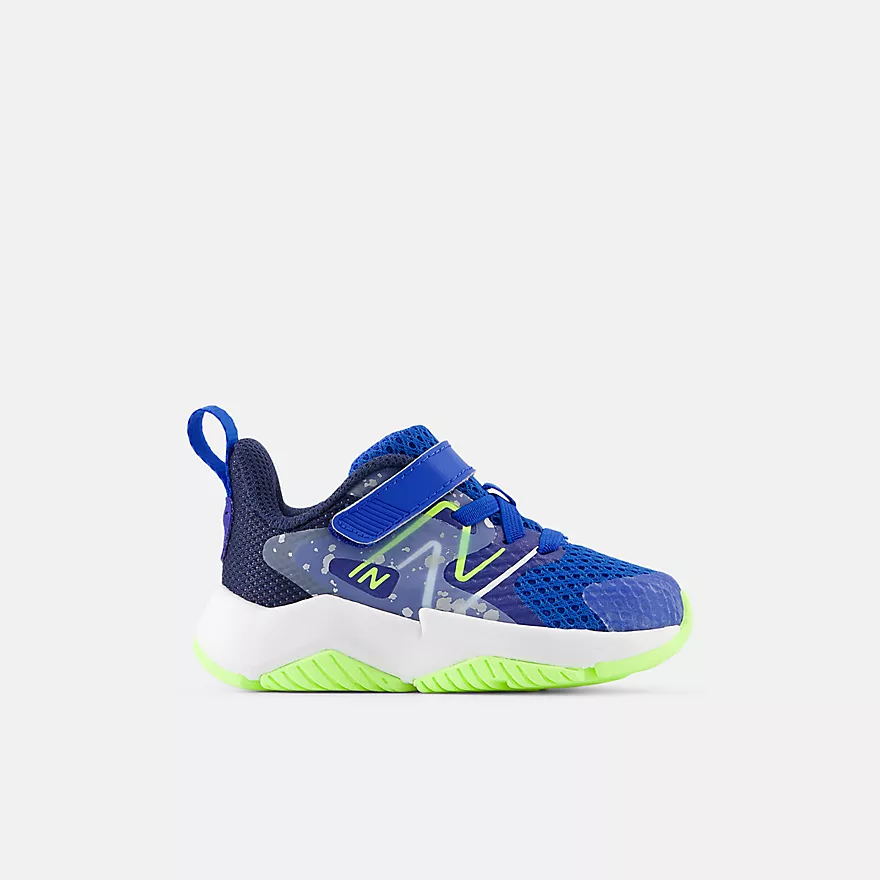








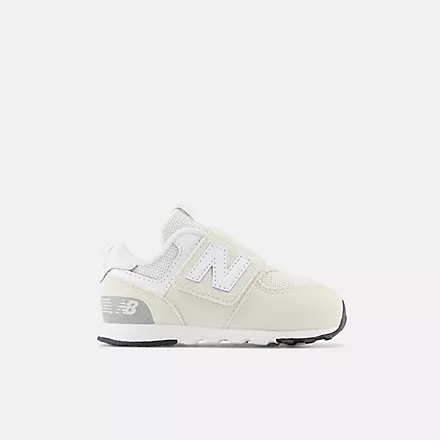





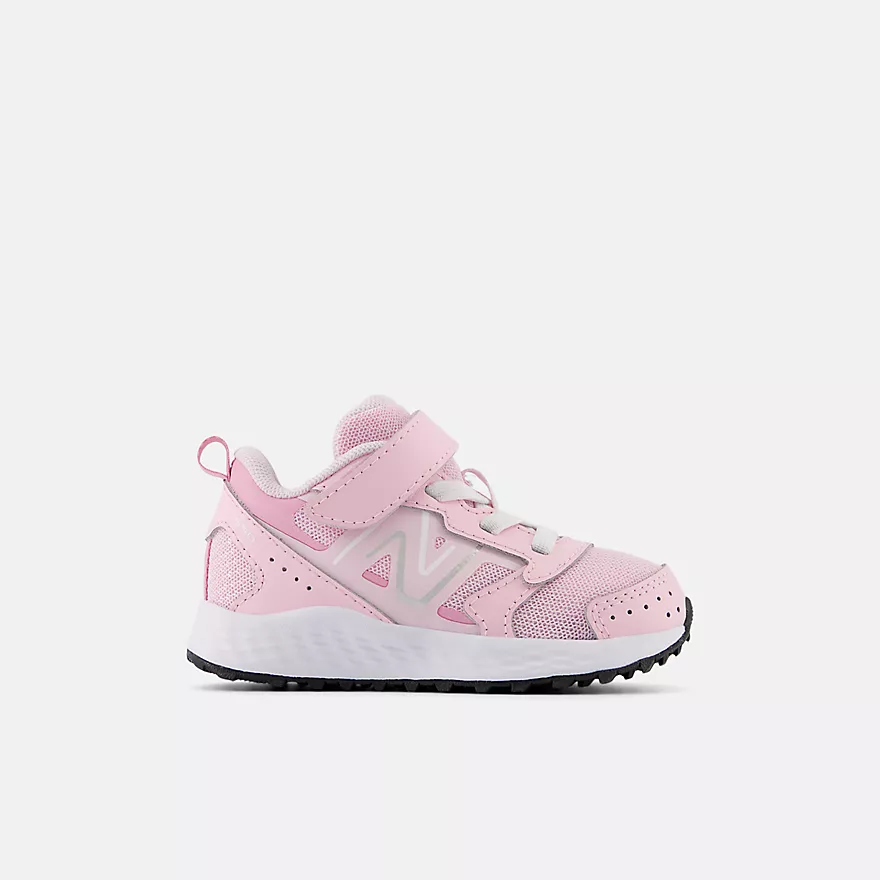















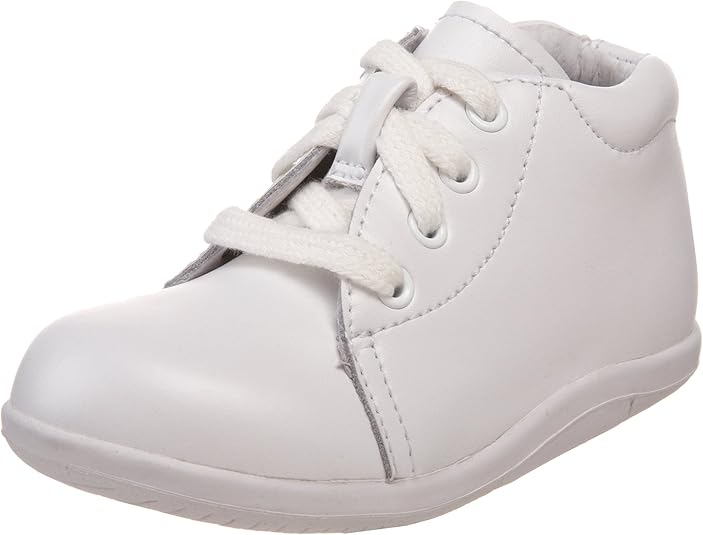




Hello, my daughter has pronating feet, instability, weak ankles, and wobbly when walking. it’s inherited as Mother was the same way. Overwhelmed at options. She walks but not sturdy nor far. What do you recommend for shoes? I bought the stride right grayson booties and also the New Balance sneaks- are either of these correct?
Hi Jay,
How old is your daughter? The Stride Rite Grayson is a great choice to help treat the issues you mentioned.
As far as the New Balance sneakers concern, I need to know which specific style you got for your daughter.
Any shoe recommendations to deter tip toe walking?
Hello Lili,
If you provide me with your child’s shoe size (length and width), I will provide you with a selection of the best shoes for a child that is walking on his or her toes.
Thank you so much for this very informative article! We have been confused about what to buy for our twin girls who are starting to walk, and you explain all of the considerations so well here. There is no other site like yours, and we are big fans, so keep up the good work!
Hello Obdulio,
I hope your daughters are taking their first steps with confidence in their new shoes. Thank you for sharing!